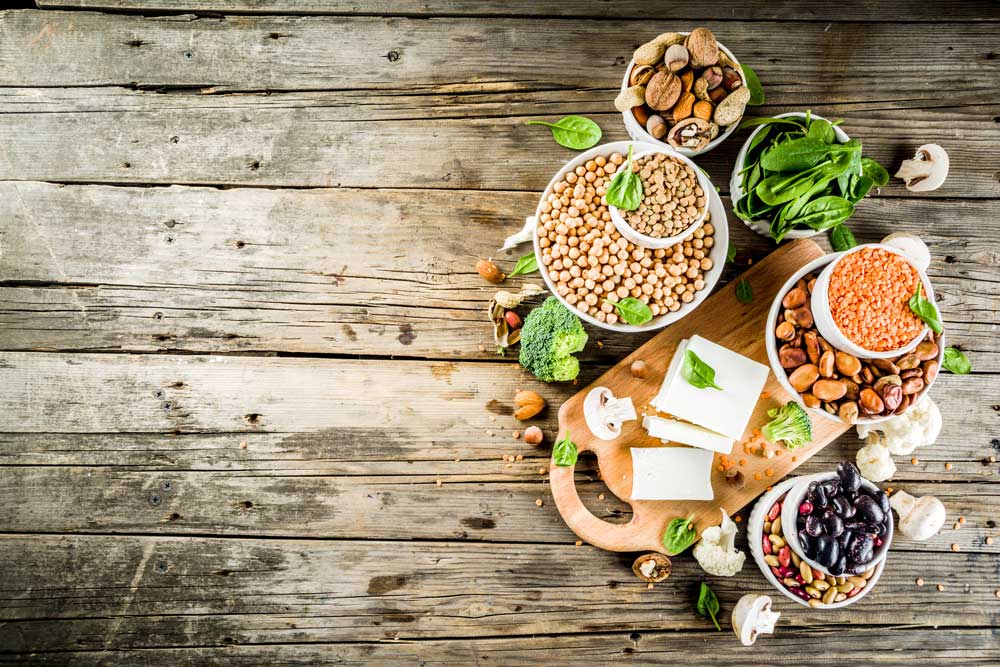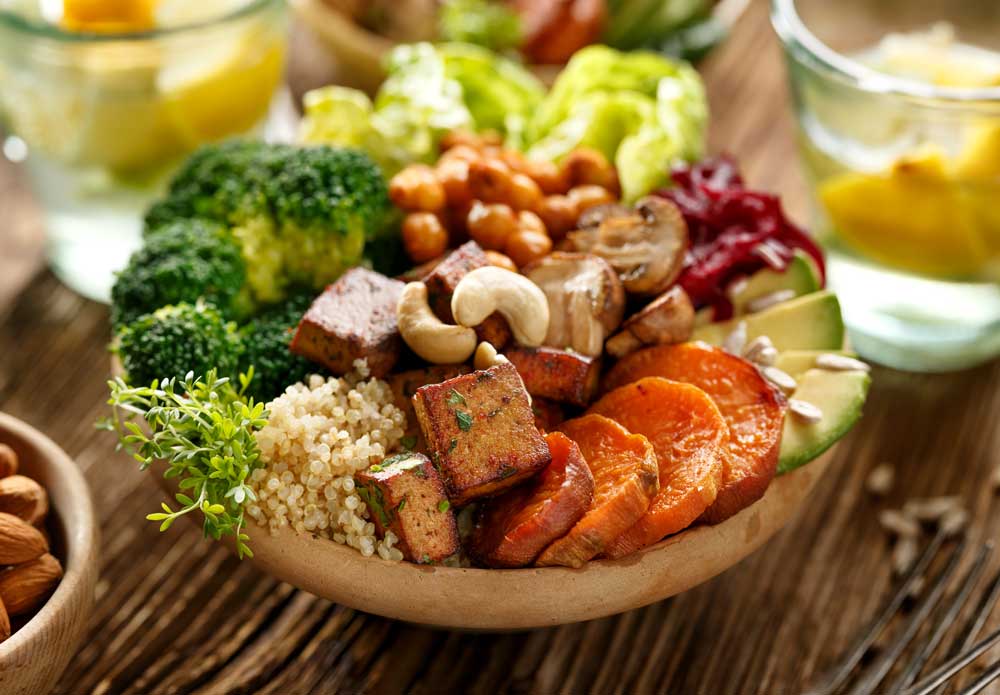In today's health-conscious landscape, there's a palpable shift towards embracing plant-based diets. Whether motivated by ethical concerns, environmental awareness or simply seeking a healthier lifestyle, individuals worldwide are increasingly turning to veganism. With this surge in plant-based eating comes a growing demand for high-protein vegan foods. Contrary to common misconceptions, a vegan diet can provide ample protein to support overall health, muscle growth and daily energy requirements.
Regardless of whether you're a seasoned vegan or just beginning to explore the benefits of plant-based eating, understanding which foods offer substantial protein content is vital for maintaining a balanced and nutritious diet. In this comprehensive guide, we'll navigate through the diverse array of plant-based protein sources, unveiling the top 15 high-protein vegan foods. From legumes and grains to nuts, seeds, and even vegetables, these nutrient-rich options not only meet but exceed the protein needs of individuals, offering a delectable and cruelty-free alternative to traditional protein sources.
In the following sections, we'll delve deep into each of these high-protein vegan foods, exploring their nutritional profiles, culinary versatility, and practical tips for incorporating them into your daily meals. Whether you're seeking to build muscle, enhance athletic performance, or simply nourish your body with wholesome ingredients, this guide will equip you with the knowledge and inspiration needed to embrace the power of plant-based protein.
What is Vegan Protein?
Contrary to popular belief, getting enough protein on a vegan diet is not as challenging as it may seem. Vegan protein is derived from various plant sources, including legumes, grains, nuts, seeds, and even some vegetables. These plant-based proteins not only provide essential amino acids but also come packed with fibre, vitamins, and minerals, making them a wholesome choice for any diet.
Chickpeas
Chickpeas, also known as garbanzo beans, are a staple in many vegan diets for good reason. These versatile legumes are not only rich in protein but also high in fibre, iron and folate. Whether roasted for a crunchy snack, blended into creamy hummus or tossed into salads and curries, chickpeas are a delicious and nutritious addition to any meal.
Tofu
Tofu, made from soybeans, is a complete protein that serves as a blank canvas for a wide range of culinary creations. With its mild flavour and firm texture, tofu can be grilled, stir-fried, baked, or blended into smoothies and desserts. Plus, it's an excellent source of calcium, iron, and essential amino acids, making it a must-have in any vegan kitchen.
Lentils
Lentils are a nutritional powerhouse, boasting high levels of protein, fibre, and various vitamins and minerals. Whether red, green, or brown, these tiny legumes are incredibly versatile and can be used in soups, stews, salads, and even veggie burgers. Best of all, lentils cook quickly and are budget-friendly, making them a convenient option for busy individuals looking to add more plant-based protein to their diet.
Soybeans
Soybeans are one of the few plant-based foods that contain all nine essential amino acids, making them a complete protein source. Whether enjoyed in the form of tofu, tempeh, soy milk, or edamame, soybeans offer a wide range of health benefits, including improved heart health, bone density, and hormone balance. However, it's essential to choose organic, non-GMO soy products to reap the full nutritional benefits without harmful additives.

Green peas
Green peas may be small in size, but they pack a powerful nutritional punch. These vibrant legumes are rich in protein, fibre, vitamins and minerals, making them an excellent addition to soups, salads, stir-fries, and pasta dishes. Plus, they're naturally sweet and kid-friendly, making them a versatile ingredient for the whole family to enjoy.
Chia seeds
Chia seeds may be tiny, but they're mighty when it comes to nutrition. These ancient seeds are loaded with protein, omega-3 fatty acids, fibre, and antioxidants, making them a superfood for vegans and non-vegans alike. Whether sprinkled over yogurt, blended into smoothies, or used as a vegan egg substitute in baking, chia seeds add a nutritional boost to any meal or snack.
Bajra
Bajra, also known as pearl millet, is a gluten-free grain that's rich in protein, fibre and essential nutrients like iron, magnesium and phosphorus. Commonly consumed in India and Africa, bajra can be ground into flour to make roti, dosa, or porridge, offering a delicious and nutritious alternative to wheat and rice.
Oats
Oats are not only a breakfast staple but also a valuable source of vegan protein and fibre. Whether enjoyed as oatmeal, granola, or overnight oats, these whole grains provide sustained energy and satiety, making them an ideal choice for busy mornings or post-workout refuelling.
Amaranth
Amaranth is an ancient grain that's gaining popularity for its impressive nutritional profile. Rich in protein, fibre and micronutrients like calcium, magnesium, and iron, amaranth offers numerous health benefits, including improved digestion, heart health and bone strength. Whether cooked as a savoury side dish or popped like popcorn for a crunchy snack, amaranth adds a nutritious twist to any meal.
Peanuts
Peanuts are not only a tasty snack but also a rich source of plant-based protein. Whether enjoyed roasted, boiled or ground into peanut butter, these legumes offer a satisfying crunch and a hearty dose of protein, healthy fats and essential nutrients like vitamin E and folate.
Flaxseeds
Flaxseeds are a nutritional powerhouse, packed with protein, fibre, omega-3 fatty acids and lignans, which have antioxidant and anti-inflammatory properties. Whether ground into flaxseed meal or used as a vegan egg substitute in baking, flaxseeds add a nutty flavour and a nutritional boost to any meal or recipe.
Green gram
Green gram, also known as mung beans, is a legume that's rich in protein, fibre, vitamins and minerals. Whether sprouted for salads, cooked into soups and curries, or ground into flour for pancakes and crepes, green gram offers a versatile and nutritious source of plant-based protein for vegans and non-vegans alike.
Kidney beans
Kidney beans are a staple in many cuisines around the world, thanks to their rich flavour and hearty texture. These legumes are not only high in protein but also loaded with fibre, vitamins and minerals like iron, potassium and folate. Whether simmered into chili, tossed into salads, or mashed into burgers, kidney beans add a satisfying protein boost to any meal.

Conclusion
In conclusion, the journey towards incorporating high protein vegan foods into your diet is not just a dietary shift but a transformation towards a healthier, more sustainable lifestyle. With the abundance of plant-based protein sources available today, ranging from hearty legumes to nutrient-rich grains, nuts and seeds, the path to meeting your protein needs without animal products has never been more accessible.
Whether you're a seasoned vegan, a curious newcomer, or someone simply looking to explore the benefits of plant-based eating, these 15 vegan protein sources stand as beacons of nutritional excellence. They offer not only a diverse array of flavours, textures, and culinary possibilities but also a plethora of essential nutrients, antioxidants, and fibre that promote overall health and well-being.
By embracing these high protein vegan foods, you're not just nourishing your body; you're also contributing to the well-being of the planet and its inhabitants. With every lentil stew, tofu scramble, or chickpea salad, you're making a conscious choice to reduce your environmental footprint, mitigate animal suffering, and promote ethical consumption.
So, whether you're seeking to enhance athletic performance, manage weight, or simply embark on a journey towards better health, rest assured that the power of plant-based protein is at your fingertips. With creativity in the kitchen and an open mind, you can transform simple ingredients into gourmet delights that nourish both body and soul.
In this age of enlightenment and empowerment, let us embrace the abundance of nature's offerings and savour the delicious journey towards a healthier, more compassionate world—one plant-based meal at a time.
FAQs
Are vegan protein sources sufficient for meeting my nutritional needs?
Yes, with proper planning and variety in your diet, vegan protein sources can meet your nutritional needs.
How can I ensure I'm getting enough protein on a vegan diet?
Include a mix of protein-rich plant foods like beans, lentils, tofu, nuts, seeds and grains in your meals.
Can I build muscle on a vegan diet?
Yes, by consuming adequate plant-based protein and engaging in regular strength training exercises.
Are there any potential downsides to consuming plant-based proteins?
Some plant proteins may lack certain essential amino acids, but this can be balanced with a varied diet.
What are some easy ways to incorporate more vegan protein into my meals?
Add beans, lentils, tofu, nuts, seeds, and grains to your meals and snack on protein-rich foods like nuts and seeds throughout the day.